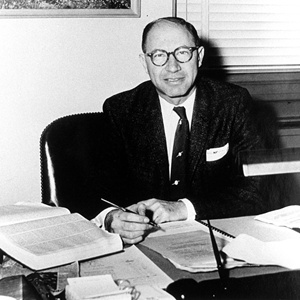
Lee C. White, advisor to Presidents John F. Kennedy and Lyndon B. Johnson, played a key role in the movement.
In honor of the yearlong anniversary of America’s historic Civil Rights Movement, Moment is collecting and sharing stories about Jews’ role in the movement. Here are two more, submitted by our readers. Responses have been edited and condensed for clarity.
The Speech that Spurred the Voting Rights Act
Murray White, son of Lee C. White, advisor to Presidents John F. Kennedy and Lyndon B. Johnson
“My father was first and foremost a Kennedy man. After the assassination, a number of JFK’s close personal friends and staffers left, and my father was also considering leaving. But in a meeting with the new president, Lyndon B. Johnson, Johnson said to him, ‘I need you more than Kennedy needed you.’ Under Kennedy, he had been assistant special counsel; under Johnson he was elevated to the position of special counsel. He was the White House’s top lawyer.
My father was a very modest individual. He had no interest in taking credit where it was not due. Yet in his memoirs and in personal conversation, there was one thing he was willing to take credit for. This was his idea that led to the incredibly powerful speech by Lyndon B. Johnson that helped lead to the passage of the Voting Rights Act of 1965. My father called that idea his biggest contribution to the Civil Rights Movement.
On March 7th, 1965, there was a horrible episode in Selma, Alabama. It was called Bloody Sunday. Civil Rights protesters were beaten up, and the whole nation was upset. My father states in his memoirs that on a Sunday, he had a brainstorm. And I’m quite certain that had to be the following Sunday, March 14th.
He was cutting the grass and clipping the hedges of our home in Washington, DC. And he mentions parenthetically in the memoir that he was cutting the grass because it was easier for him to do it than to ask my brother or me to do it. So he was doing the yard work because me and my brother were basically lazy. Well, it turned out there was a silver lining in the cloud of my laziness, because while he was doing the yard work that day he had the following brainstorm.
The administration was planning to submit the Voting Rights Act to Congress in the traditional way, which was merely sending over mimeographed papers with the legislation. Now he had the idea, well why don’t we do something dramatic? Why doesn’t President Johnson make a speech imploring the Congress to pass this bill, taking advantage of the turmoil that the country was feeling in the wake of the Bloody Sunday episode of the week before?
So my father goes up to the Oval Office and tells the president his idea. The president loves it. The president calls up the Speaker of the House, John McCormack, and says John, I want you to invite me over to give a speech.
The speech, which was mostly written by Richard Goodwin, was carried on national TV and radio. It had a galvanizing effect on America. I read when Martin Luther King, Jr. watched the speech on TV, it brought tears to his eyes. It is universally regarded as one of the high points—if not the high point—of LBJ’s presidency.
Part of it was the great elegance Goodwin put into the speech, and part of it was Johnson had a great belief in this legislation, and viewers across the country could feel his sincerity and commitment through the television screen. At one point in the speech he uses the phrase, “we shall overcome, which was of course the anthem of Civil Rights Movement. It was an absolute splash; I think my father calls it a home run. I think one could call it a grand slam home run.”
North Carolina Ends Factory Desegregation—with Backlash
Edith Claman
“In the mid-1950’s, our family company, Lewittes and Sons, under the leadership of my late husband, Mike Claman, built a new factory in the western part of North Carolina. Although its main production facilities at the time were in upstate New York, it was decided to move to ‘furniture land’ to be closer to supplies, such as lumber, and for the availability of experienced labor.
From the onset, both whites and African Americans were employed at equal pay and with equal training opportunities sponsored in-house. But the facilities were segregated, as was customary in all Southern factories in those years.
Mike was constantly on the factory floor, working with his employee, but by the late 1950’s and early 1960’s, when Civil Rights became a ‘hot,’ highly contested issue, he was very disturbed by segregation within our plant.
One day in the early 1960’s, when drinking from the ‘Whites Only’ water fountain on the factory floor, he had had enough of it. He tore off the signs. He then went to the Ladies’ and Men’s Bathrooms and tore off the signs there, announcing that there would be no more segregation within the plant.
The outcry was horrendous, with delegations marching into Mike’s office. He politely informed the workers that if they did not want to drink the same water, from the same fountains, they could go thirsty; if they did not choose to use common facilities, they would have to wait until they went home.
It was definitely not a happy time in the factory, but Mike, with the backing of the family, did not back down.
From the plant’s very inception, Mike had hired and become friendly with several black Baptist ministers in our town of just under 1,000 people. Their churches could not afford full-time ministers and most worked at local factories.
At rest breaks, when most of the employees ate and/or gossiped, these ministers usually sat quietly and read their Bibles. Mike became friendly with several of them and often talked ‘Bible’ with them.
Mike had become deeply involved in community affairs and was appointed by the then-governor, James Hunt, to the State Board of Governors of the State Community College System.
It was only a matter of time before the local Ku Klux Klan became enraged by what Mike was doing in our factory, vis-à-vis segregation. There were three cross-burnings in a row: The first at the home of a gay decorator/designer who was employed by our firm; the second at the home of one of the Baptist ministers with whom Mike had become particularly friendly; and the third at our home.
Mike immediately called Governor Hunt, who sent a team of investigators to Raleigh. Although everyone in town knew who had set up the crosses and set them aflame, they investigators could never find the culprits.
Fortunately, all who had suffered these incidents were safe: we helped move the decorator to the next town, which was a little larger and a little more tolerant. He continued working for us; we continued to employ the Baptist minister although he was given protection; we stayed put until a few later when we built a new house in a neighboring town.
Mike and I were always proud of what he had accomplished early on in the battle for Civil Rights. Although always ostracized as both Yankees and Jewish, the community came to accept us, if not our goals.”






